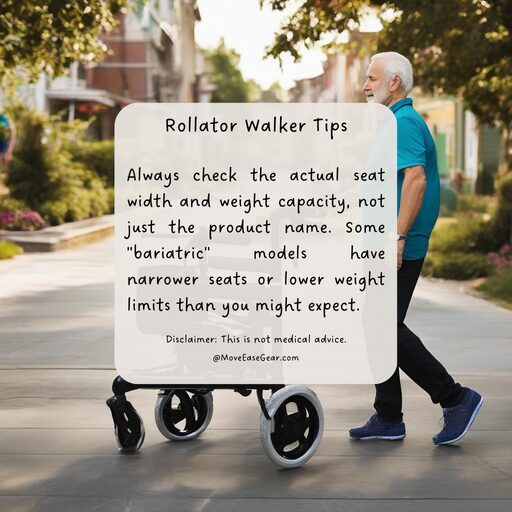*This post may contain affiliate links for which I earn commissions.*
I’ve had a great passion for trying to help other people find the right mobility aid for their needs since I needed to assist my elderly father with finding a good rollator walker. So, let’s now look into bariatric rollators—zeroing in on key features that can make all the difference in a person’s daily living.
Bariatric Rollator Walker 500 lb Weight Capacity
Weight capacity is very important in heavy-duty rollators. Those that have a 500-pound capacity, such as the Medline Heavy Duty Rollator, have been known to really work out for many people. These models have extra bracing fitted onto them to offer larger persons the stability and support they need.
But here is the catch most of them miss: as essential as a high weight capacity may be, it is not the only thing when considering a product of this nature. In my experience, the build quality comes into play just as much. They often shave off some pennies by using cheaper materials to hit that 500 lb mark.
That’s why I’d always recommend you check user reviews and test the rollator yourself, if possible, before buying.
Extra-Wide Seat Rollator for Obese Users
Comfort is key for those who need to rest frequently. In my research, I have found that bariatric rollators with extra-wide seats make all the difference in the world. For example, the Drive Medical Nitro HD Rollator has an 18″ wide seat, which seems to be very comfortable for many people.
The pro tip here is that the width of the seat can actually make or break a rollator’s usability to obese users. A wider seat does not only bring in more comfort but also adds stability while the user is seated. However, bear in mind that a wider seat is usually related to a wider frame in general, which could be hard to handle through narrow spaces. I’d always advise people to measure the doorways of their home prior to buying one.
Heavy-duty rollator with reinforced frame for overweight seniors
One of the major concerns for overweight seniors who need to use their rollators daily is durability. I’ve seen so many people take advantage of heavy-duty rollators with reinforced frames. Example: The NOVA Mighty Mack literally has been a lifesaver to so many, giving them extra support and years of service.

These strengthened frames often have larger parts throughout. Many bariatric rollators are fitted with 8-inch wheels, and I have found these easily offer much greater stability and maneuverability on any surface. But there is one proviso—the added strength normally means extra weight, making the rollator heavier to lift into a car trunk. People should always be prepared for that extra heft.
Price Considerations When Buying Rollator Walkers
Yes, price could be a factor, but that does not mean you buy it based on price alone. All things considered, some of the good-quality bariatric rollators might reflect a slight price increase, yet bring along better durability, comfort, and safety. In my experience, prices are competitive and range from around $150 to $400 or so for high-end models.
Lastly, when choosing a bariatric rollator, ensure that weight capacity, seat width, frame strength, and other options meet your requirements. A rollator well-chosen will go a long way toward enhancing mobility, independence, and the overall quality of life. Contacting a health professional or a mobility specialist for advice on all types related to the best choice for individual needs is also wise.
